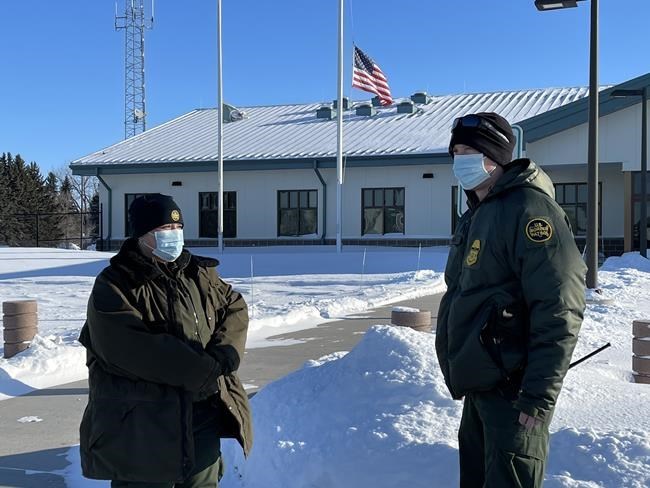A year after a family of four from India froze to death while trying to walk to the United States from Manitoba, the agency tasked with patrolling the border says others have not been deterred from attempting the same treacherous journey.
U.S. Customs and Border Protection has seen a drastic uptick in recent months of people trying to enter North Dakota, Minnesota and Wisconsin illegally from Canada.
Those states have seen about 90 apprehensions since October, said Kathryn Siemer, acting patrol agent in charge of the station in Pembina, N.D. The same area saw roughly 80 apprehensions from October 2021 to September 2022.
"The numbers are definitely increasing back to a pre-pandemic type situation," she said.
"It's a pretty well-known fact that the organizations don't care about the loss of life. They care about people as revenue."
The frozen bodies of Jagdish Patel, 39; his wife Vaishaliben Patel, 37; their 11-year-old daughter, Vihangi; and their three-year-old son, Dharmik, were found on Jan. 19, 2022, near Emerson, Man., just metres from the U.S. border.
Manitoba RCMP renewed calls Thursday for information about the family's time in Canada.
Investigators believe a human smuggling network was behind the family's journey to Canada from a village in the state of Gujarat in western India, as well as the border-crossing attempt.
The family was dropped off near the border in frigid temperatures and was trying to cross into the U.S. on foot among a larger group when the four became separated.
RCMP say Patels arrived in Toronto on Jan. 12, 2022 when they were picked up by a private vehicle. Over four days the family moved around parts of southern Ontario, including Mississauga and Welland.
Police are still trying to determine how the Patels travelled from Ontario to Manitoba.
"These four people lost their lives. It's really important for everyone to remember that and to do what they can to prevent anything like this happening again," Cpl. Julie Courchaine said Thursday.
"This was preventable. This shouldn't have happened."
Siemer was the U.S. border agent in charge the day the Patel family was found.
"It's always sad when you look back on a milestone like that … you just think about what could have been done to prevent something as tragic as that family dying in the blizzard," she said.
Temperatures hovered around - 35 C that night. Border patrol agents stopped a van with a driver and two Indian nationals just south of the border, said Siemer. Agents later spotted five others from India walking in the snow. They told officers that they had been walking for more than 11 hours in the cold and that four others had become separated from the group overnight.
The Patel family was found about three hours later.
One woman in the group had to be taken to hospital, where part of her hand was amputated due to frostbite.
Situations like that reinforce the work Siemer has been doing since 2007.
"Yes, we're stopping illegal crossings, but we're also a life-saving agency," she said.
Data from the U.S. Border Patrol's online dashboard shows nearly 2,250 encounters at the northern land border for 2022 — on par with figures before the COVID-19 pandemic.
Loosened travel restrictions could account for the uptick, said Siemer. She added the agency is seeing more people from Mexico try the northern route as opposed to the southern border, which has more agents and infrastructure.
The dashboard shows there were approximately 1,000 encounters with people from Mexico at the northern land border last year.
The agency has also seen an increase in the number of encounters with families attempting to cross, outpacing pre-pandemic levels.
Siemer could not say why there are more families, but said it's always been an issue.
"People are always trying to find a better way of life. They bring their kids across, and children don't have a choice."
Jagdish Patel's father told The Canadian Press his son held many jobs in India, but none worked out.
Northern land borders in the states of New York, Washington and Vermont had the most interactions last year, data from U.S. Border Patrol suggests.
Fritznel Richard, who was originally from Haiti, was found dead from hypothermia in a wooded area south of Montreal earlier this month. Quebec police have said he was trying to reach family south of the border.
In the Patel family's case, Steve Shand, a Florida resident, faces charges of human smuggling. Shand was driving the van carrying undocumented Indian nationals, court documents say. His trial has been delayed several times due to COVID-19 and natural disasters, and is expected to take place in April.
Two men in India face charges including human trafficking in the Patels' deaths. Police in India have said they are also investigating suspects in Toronto and Vancouver.
Courchaine would not confirm RCMP are looking at suspects in either cities, saying the investigation is ongoing. There have been no arrests in Canada.
This report by The Canadian Press was first published Jan. 19, 2023.
Brittany Hobson, The Canadian Press



